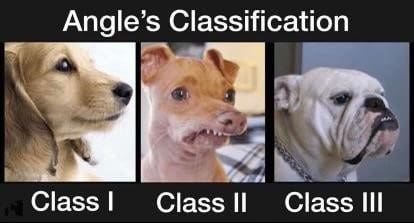Most people pursue Invisalign treatment for aesthetic reasons – to straighten crooked teeth or to close gaps between teeth. While your dentist wants you to have a nice smile, he/she is also thinking about your occlusion. What is occlusion anyway? In simple terms, occlusion aka bite refers to how the top teeth meet the bottom teeth. The term “malocclusion” means “bad bite”. Malocclusion is not merely a cosmetic concern, but can also lead to a range of dental issues depending on the type and severity.
Teeth are meant to come together in a certain way for optimal function. When teeth are not properly aligned, they tend to rub against each other, causing the enamel to wear down prematurelly. Thinning of the enamel can lead to increased incidences of tooth damage, decay, and sensitivity. Malocclusion also decreases the chewing efficiency and causes the jaw muscles to overwork in order to compensate. Straining of the jaw muscle can lead to headaches, earaches, neck pain, and other symptoms over time.
Are there clues to tell whether or not your bite may be off? Here are some of the common symptoms that are associated with a bad bite: pain across your temple in your brow which sometimes can manifest as migraines; tension headaches especially in the morning; clicking and popping of the jaw as well as persistent headaches that won’t go away; excessive lower arch enamel wear; gum recession; and notching of your teeth around your gum line.
Here are five common types of malocclusion that can be treated with Invisalign and their associated oral health risks if left untreated.
- Crossbite refers to the upper teeth fitting inside the lower teeth when they meet together. It can affect a single tooth or groups of teeth. It can involve the front (anterior) and/or back (posterior) teeth as well as one (unilateral) or both sides (bilateral) of the mouth. Besides being cosmetically unappealing, crossbites can compromise the chewing function, causing excessive enamel wear, chipped/cracked teeth, asymmetric jaw growth, jaw joint problems, and restricted airways leading to snoring and other bite issues. Moderate posterior crossbites and single tooth anterior crossbites can be successfully treated with Invisalign alone or in combination with crossbite elastics.
- Open bite occurs when there is a gap between the top and bottom front teeth when closing the mouth. This makes it very difficult to bite and chew with the front teeth and puts extra wear and tear on the back teeth. An open bite can impede speech and pronounciation. Depending on the etiology and the age of the patient, Invisalign as well as behavior modification with a tongue appliance may be prescribed. Jaw surgery may be necessary to correct severe cases of open bite in adults.
- Deep bite (deep overbite) occurs when the top front teeth vertically overlap the bottom front teeth by more than 2mm. A deep bite is one of the most common bite problems across all age groups. A deep overbite puts excessive wear and tear on the front teeth and can lead to damage and chipping of the teeth over time. Deep bites also put extra strain on your jaw joints, which can lead to temporal mandibular joint disorder (TMD). A majority of the deep bites can be corrected by Invisalign with or without bite ramps. Invisalign bite ramps are small, triangular ramps that are placed on the aligner trays behind the front teeth. These ramps cause the back teeth to be separated slightly and over time, the back teeth will gradually drift together.
- Overjet (buck teeth) occurs when the top front teeth protrude in front of the bottom front teeth. Overjet can lead to irregular facial appearance, embarrassment when smiling, speech issues, and TMD. Overjet commonly presents with dental crowding. Crowded teeth trap food residues easily and are hard to clean, which can lead to tooth decay and gum disease. Mild to moderate cases of overjet can be corrected with Invisalign though severe cases may need surgery.
- Underbite occurs when the lower teeth extend further out than your upper teeth. This condition makes it difficult to chew and speak properly, and can also wear down the teeth. While Invisalign can treat mild underbites, moderate to severe cases may require surgery.
Invisalign can deliver an amazing smile and ensure the proper function of your teeth. At Parkview Dental Associates, we utilize state-of-the-art Itero Element 5D technology to evaluate each case and map out the step by step transformation you can expect throughout the treatment. Call us at 608-837-7394 or contact us online to schedule a FREE consultation!

